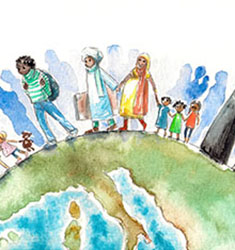Program Description
Sociology investigates the relationships between social order and social change in three interconnected areas along the scale of individual to global; our personal lives, the communities we live in, and the world as a whole. When examining personal lives, sociologists study deviant behavior, family dynamics, and individuals’ racial, ethnic, gender, and sexual identities. At the community level, sociologists study poverty, prejudice and discrimination, education, corporate and business behavior, the criminal justice system, housing and homelessness, the health care system, and social movements. Finally, at the global level, they review human population dynamics, societal conflict, cultural diversity, socially-induced environmental change, globalization, and modernization.
The Sociology program consists of five core courses that serve as an introduction to sociological theory and application, research methods, and social statistics. The remainder of the curriculum is comprised of courses from four areas of sociology: Diversity, Globalization, Criminology, and Population and Health, as well as a selection of electives. By the program’s end, graduates have invaluable critical thinking skills and awareness of social issues that affect all areas of modern life. This set of knowledge and skills is necessary to find work in a variety of fields, and invaluable in our increasingly globalized and culturally diverse society.
The Student Experience
Enrich your studies, pad your resume, prep for grad school applications and pursue your areas of interest by completing an internship or learning abroad program. Work with a faculty mentor to write a senior thesis. Students seeking involvement in the Department of Sociology and Criminology and the opportunity to network may join the Sociology and Criminology Student Association or Alpha Kappa Delta (an international Sociology honor society).
Career Opportunities
Sociology students may find work in several areas public service. Take on roles in criminal justice as a parole counselor or rehabilitation specialist, enter the world of business as an HR or training representative, or find work as a social services case manager, advocate, or counselor. If students attend graduate school or complete certification programs, career options include work as lawyers, administrators, teachers, psychologists, therapists, librarians, professors, or researchers.

 Sociology
Sociology


